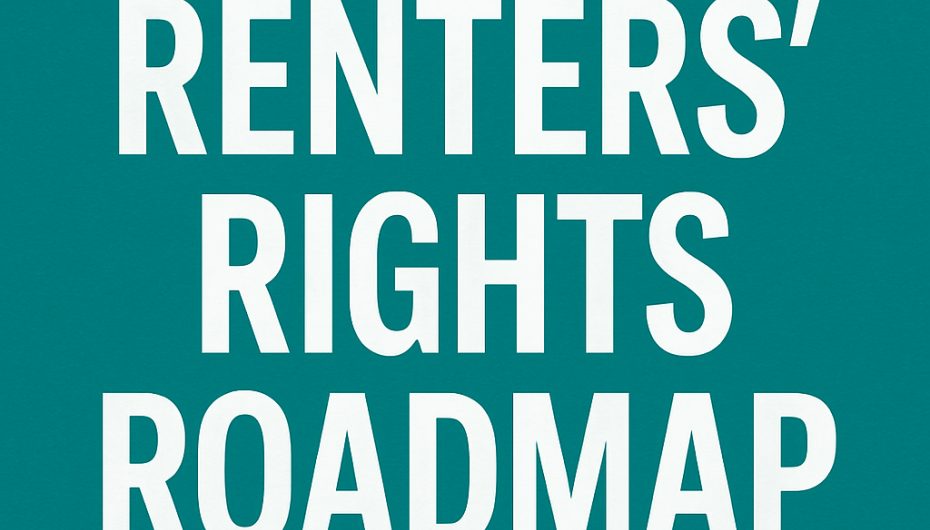 14th November 2025
14th November 2025
It's Finally Here - The Renters' Rights Roadmap Released
The government has now published its official roadmap for implementing the Renters’ Rights Act 202, a landmark reform package widely described as the biggest generational change to private renting. This legislation will reshape how landlords operate, how tenancies are structured, and what obligations and rights apply across the private rented sector (PRS).
As a landlord, understanding what is coming—and when—is essential. Below, Boydens provides a clear breakdown of the reforms, timelines, and what you should prepare for.
The Biggest Structural Changes to PRS in a Generation
The Renters’ Rights Act introduces a series of reforms aimed at improving tenant security and raising standards across the sector. Many of these measures will also directly affect how landlords manage properties and regain possession.
Headline changes include:
- Abolition of Section 21 “no-fault” evictions
- All new and existing tenancies becoming Assured Periodic Tenancies
- Tougher and clearer Section 8 possession grounds
- Rent increases limited to once per year via a revised S13 process
- A ban on rental bidding wars and limits on rent in advance (maximum one month)
- Legal protection for tenants with children or those receiving benefits
- Mandatory consideration of pet requests, with required written reasons for refusal
- Strengthened enforcement powers and higher penalties for offences
The government's roadmap sets out three phased stages for turning the Act into operational law.
Phase 1 – Major Tenancy Changes (from 1 May 2026)
This is the most significant part of the transition for landlords. From this date, the entire PRS will move to a periodic-only system.
Key changes from 1 May 2026:
1. End of Section 21 Evictions
Section 21 will no longer exist. Possession will only be possible through Section 8 grounds.
2. All Tenancies Become Assured Periodic Tenancies
- Applies to new and existing tenancies.
- Tenants may remain indefinitely.
- Tenants can leave with two months' notice.
3. Updated Section 8 Grounds
Improvements include:
- Stronger grounds for anti-social behaviour
- Enhanced powers for persistent rent arrears
- New grounds allowing owners to recover their property when genuinely needed
4. Rent Increase Restrictions
- Limited to one increase per year
- Revised S13 procedure
- Minimum two months’ notice required
5. Ban on Rental Bidding & Large Advance Payments
- No offers above the advertised rent
- Maximum one month’s rent upfront allowed
6. Anti-Discrimination Measures
Landlords and agents may not:
- Refuse applicants because they have children
- Reject applicants because they receive benefits
- Withhold viewings or property information on these grounds
7. Landlords Must Consider Pet Requests
- 28 days to respond
- Written justification required if refusing
- Regulations will clarify permitted pet insurance requirements
8. Stronger Enforcement & Higher Penalties
- Expanded rent repayment orders
- Higher maximum fines for repeat offences
- More investigatory powers for local councils (from December 2025)
Tenancy Agreements Under Phase 1
- New tenancies (from May 2026): landlords must issue specific written information (draft requirements published Jan 2026).
- Existing written agreements: no need to re-issue, but landlords must provide the new government Information Sheet by 31 May 2026.
- Existing verbal agreements: landlords must provide written confirmation of the main terms by 31 May 2026.
Phase 2 – National PRS Database & Mandatory Ombudsman (from late 2026)
Phase 2 introduces new compliance obligations for landlords.
1. PRS Database (Landlord Register)
Mandatory for all landlords. Requirements expected to include:
- Contact details for all landlords
- Full property details (type, bedrooms, occupancy, furnishings)
- Gas & Electrical Safety Certificates
- EPC information
- Annual registration fee
Public visibility and data-sharing will increase after initial rollout.
2. Landlord Ombudsman – Mandatory Membership
Expected fully operational by 2028, the Ombudsman will:
- Provide a mandatory redress scheme for tenants
- Resolve disputes without court action
- Offer training/guidance for landlords
- Require annual membership fees
Phase 3 – Decent Homes Standard for PRS (consultation-led timeline)
The government will introduce a Decent Homes Standard for private rented properties for the first time, similar to requirements in the social housing sector.
Key elements under consultation include:
- Minimum property condition standards
- Mandatory remediation of serious hazards
- Extended Awaab’s Law for strict repair timeframes
- Proposed EPC C rating minimum by 2030
A full PRS-wide rollout may occur in 2035 or 2037, but landlords are encouraged to improve properties earlier where feasible.
How the Government Is Supporting the Transition
The roadmap outlines support for landlords and councils, including:
- Official landlord guidance (Nov 2025)
- Tenant guidance and communications campaigns (from April 2026)
- Additional funding for local council enforcement
- Investment in a new digital court system for possession claims
What Landlords Should Do Now
Although most changes start in 2026, landlords can begin preparing:
✔ Review tenancy processes ahead of the shift to periodic tenancies
✔ Assess property compliance (EPC, safety certificates, general condition)
✔ Understand how future Section 8 grounds will apply
✔ Prepare for registration with the PRS Database
✔ Review your rental pricing strategy under the ban on bidding wars
✔ Consider policies for pets with appropriate insurance plans
✔ Discuss potential portfolio impacts with your letting agent
Support for Boydens Landlords
This is a major policy shift, but with the right preparation, professional landlords can operate confidently under the new regime.
At Boydens, we are already working through the detail of the Act and will:
- Update all management practices in line with the new law
- Provide compliant tenancy documentation and processes
- Advise landlords on possession, compliance, and property standards
- Manage communication with tenants throughout the transition
- Ensure every property under management meets the new legislative expectations
Speak to Boydens — Your Local Lettings Experts
If you’re a landlord and want clear, practical advice on how the Renters’ Rights Act 2025 will affect your properties, our experienced lettings specialists are here to help.
📞 Contact your local Boydens branch today
📧 Or speak directly to our lettings team for personalised guidance on preparing for the upcoming reforms.
Boydens — supporting landlords with expert advice, compliance confidence, and outstanding local service.







